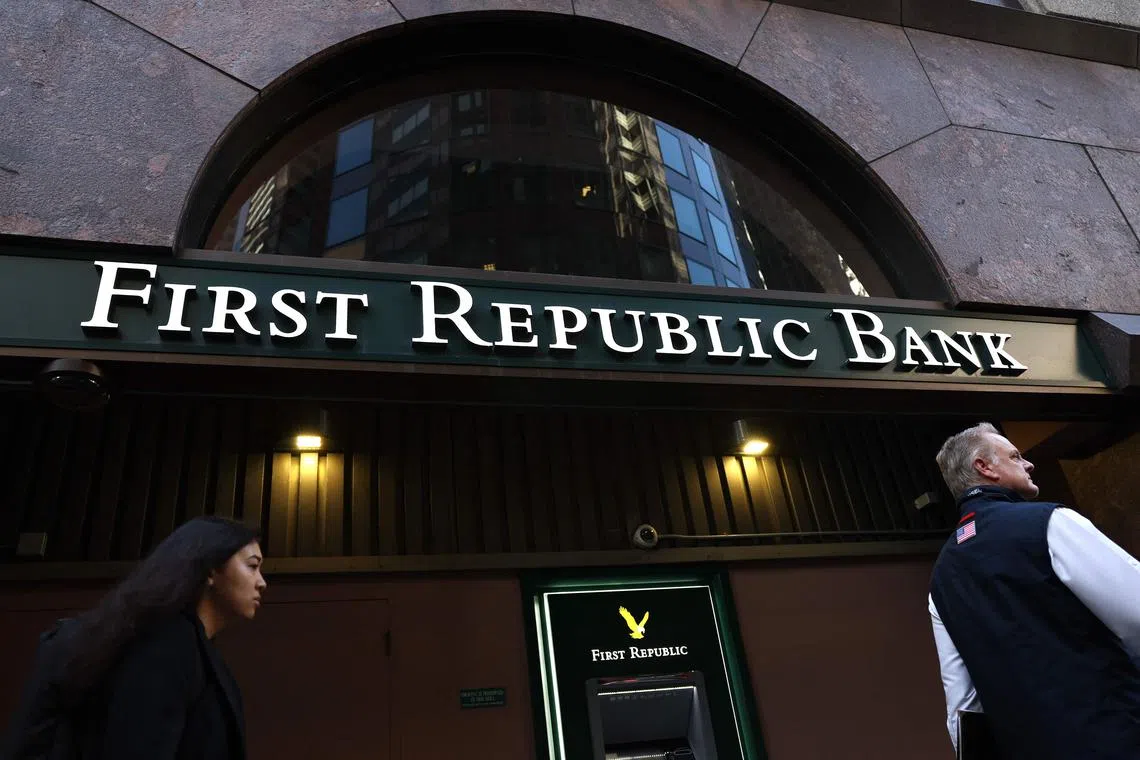First Republic stuck in stand-off between US and banking industry as stock plummets
Sign up now: Get ST's newsletters delivered to your inbox

First Republic’s issues stem from its stockpile of loans at low interest rates, including an unusually large portfolio of jumbo mortgages to wealthy clients.
PHOTO: AFP
New York – The fate of First Republic Bank has become a game of chicken between the US government and the lender’s largest rivals, with both sides seeking to avoid steep losses and hoping the other will save the troubled firm.
As the bank’s stock keeps lurching lower – dropping 49 per cent on Tuesday and 30 per cent the next day
Senior officials at the Federal Deposit Insurance Corp (FDIC) have even discussed whether to lower their private assessment of the bank, a move that would curb its access to a pair of Federal Reserve lending facilities.
On the other side, executives at several big banks are baulking at getting even more involved in a way that would lock in losses. Some expect that if they wait, they will get at least some of those deposits back – and might fare even better than if they intervene, potentially throwing good money after bad.
“There is some nervousness about how Silicon Valley Bank (SVB) went down, and maybe they would like to see if First Republic can work out its problems itself,” said Dr Stephen Lubben, a professor at Seton Hall University’s School of Law.
“Regulators are also probably worried that if this does not stop, who is next?” he said. “That is, who comes after First Republic on the hot seat?”
First Republic’s issues stem from its stockpile of loans at low interest rates, including an unusually large portfolio of jumbo mortgages to wealthy clients. Those debts have lost value amid Fed rate hikes, prompting some depositors to yank their money.
After the collapse of SVB in March stoked concerns about the soundness of regional lenders, First Republic was left paying more for funding than it earns on many of its assets. This means the firm faces what analysts predict will be at least a year of losses.
The bank remains fully operational and executives emphasised in an earnings report on Monday that it has more than ample access to cash to serve clients. Still, its leaders acknowledged that they are looking for strategic options.
The clock for striking such a deal began ticking louder late last week. United States regulators reached out to some industry leaders, encouraging them to make a renewed push to find a private solution to shore up First Republic’s balance sheet, according to people with knowledge of the discussions.
The calls also came with a warning that banks should be prepared in case something happens soon.
A number of rescue proposals have so far failed to come to fruition.
Earlier this week, Bloomberg reported that First Republic was looking to potentially sell US$50 billion to US$100 billion of assets to big banks that would also receive warrants or preferred equity as an incentive to buy the holdings above their market value.
But executives at five of the biggest banks, speaking on condition that they not be named, dismissed the notion of once again banding together to prop up First Republic, especially when it could mean paving the way for investors or a competitor to scoop up the firm at a bargain price.
Several banks would prefer that, if it becomes necessary, the FDIC seize First Republic and sell it off. Such a resolution, they said, would be cleaner, even if banks lose money. Some have already taken reserves.
The group of banks accounted for most of First Republic’s US$50 billion of uninsured deposits at the end of the first quarter. But, as depositors, they would be at the front of the line to recover money if the bank’s woes were resolved.
Across the industry, First Republic’s quarterly earnings report on Monday has come to be regarded as a disaster. The firm announced a larger-than-expected drop in deposits, then declined to take questions as executives presented a 12-minute briefing on results.
The shares promptly tilted into a dive in late trading that day. Altogether, they are down 95 per cent in 2023. Industry executives said it was possible that – regardless of its share price – First Republic could press onwards indefinitely. Also, the FDIC has shown it is in no rush to seize the firm and take another multibillion-dollar hit to its insurance fund. BLOOMBERG


